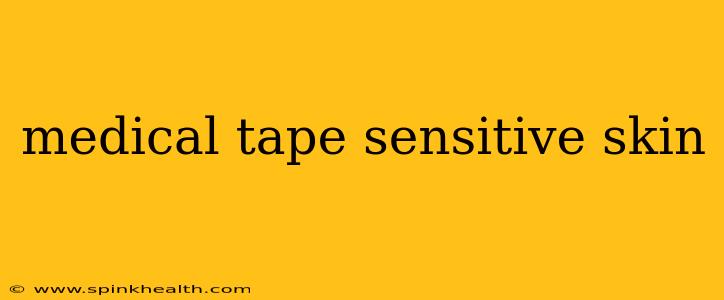Finding the Perfect Medical Tape for Sensitive Skin: A Journey to Relief
Let's be honest, nobody wants the added irritation of medical tape on already sensitive skin. Whether it's for a wound dressing, a medical device, or simply holding a bandage in place, finding the right tape can feel like searching for a needle in a haystack. But it doesn't have to be a painful experience. This journey will guide you through the world of medical tapes, helping you discover the perfect solution for your delicate skin. My name is Sarah, and I've spent years researching and testing various medical adhesives, so I know firsthand the frustration (and sometimes pain) of ill-suited tape. Let's get started!
What types of medical tape are best for sensitive skin?
This is the million-dollar question, isn't it? The truth is, "best" depends on your specific needs and sensitivities. However, several types consistently rank high for their gentleness:
- Hypoallergenic Tapes: These are specifically designed to minimize allergic reactions. Look for tapes clearly labeled "hypoallergenic" and free of common irritants like latex.
- Silk Tapes: Incredibly soft and gentle, silk tapes are a fantastic option for delicate skin. They are usually less sticky than other types, making them ideal for situations where frequent removal is necessary.
- Paper Tapes: While not as strong as some other types, paper tapes are breathable and often hypoallergenic. They're a good choice for short-term use and less sensitive areas.
- Cloth Tapes: Certain cloth tapes, particularly those made from soft materials like cotton, can be gentler on sensitive skin. However, always check the ingredient list to ensure no potential irritants are present.
How do I know if I'm allergic to medical tape?
Reactions to medical tape can range from mild redness and itching to more severe symptoms like blistering or swelling. If you experience any of these after applying medical tape, discontinue use immediately. A mild reaction might just mean the tape isn't suitable for your skin, while a severe reaction requires a visit to your doctor or dermatologist. They can help identify the specific allergen and recommend alternative options.
Are there any natural alternatives to medical tape?
Yes! While not as effective for all applications, some natural alternatives exist:
- Medical-grade adhesives: Some adhesives are specifically formulated for sensitive skin and contain natural or plant-derived ingredients. Look for brands that emphasize hypoallergenic or sensitive skin formulations.
- Cloth strips and bandages: For simple wound dressings, soft cloth strips secured with gentle knots can be a good alternative. However, this approach might not be suitable for all situations.
What should I look for when buying medical tape for sensitive skin?
Reading the label carefully is crucial! Look for:
- "Hypoallergenic" labeling: This ensures the manufacturer has taken steps to minimize the risk of allergic reactions.
- Latex-free: Latex is a common allergen, so avoid tapes containing it.
- Ingredient lists: Carefully check the ingredients for potential irritants.
- Breathability: Breathable tapes are less likely to trap moisture and irritate sensitive skin.
How can I minimize irritation from medical tape?
Even with the gentlest tape, some irritation can occur. Here are some tips to minimize it:
- Prepare the skin: Clean and dry the skin thoroughly before applying the tape.
- Apply gently: Avoid stretching the skin too tightly while applying the tape.
- Use a skin barrier: Applying a thin layer of a hypoallergenic barrier cream or ointment before applying the tape can help protect the skin.
- Remove carefully: When removing the tape, do it slowly and gently to minimize pulling and irritation. Consider using warm water and a gentle washcloth to help loosen the adhesive.
Finding the right medical tape for sensitive skin takes a bit of trial and error, but with the right information and a bit of patience, you can find a solution that provides the support you need without causing unnecessary discomfort. Remember, always consult a healthcare professional if you have concerns or experience severe reactions.

